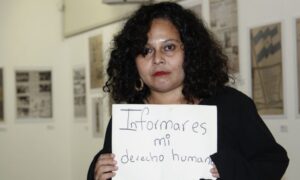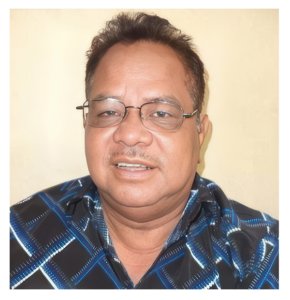Repression, persecution, exile, and even statelessness are part of what Nicaraguan journalists have experienced with increasing intensity since the 2018 protests. As part of this persecution, many have gone to jail, been expelled from their country, or live under regimes of reporting to the police every two weeks.
However, the disappearance of Fabiola Tercero Castro, which began on July 12, 2024, is of particular concern to organizations working with political prisoners and press freedom, given the length of time that has passed without any information about her.
The last time Tercero was heard from she managed to warn those close to her that members of the National Police were raiding her home in Managua. According to records from the Nicaraguan Mechanism for the Recognition of Political Prisoners, which operates from exile, authorities seized her computer and other work materials during the raid.
“Unfortunately, [Fabiola Tercero] remains missing,” Carlos Herrera, a board member of the Central American Network of Journalists (RCP, for its acronym in Spanish), told LatAm Journalism Review (LJR). “We Nicaraguan journalists know that the regime is capable of holding her in conditions of total isolation, but if it has been sustained for so long, we would already be talking about a situation of torture. If she is in total isolation and has spent all this time in total isolation, it could already be classified as torture and crimes against humanity.”

Nicaraguan journalist Fabiola Tercero Castro has been missing for more than a year. (Photo: Social media)
To date, the Nicaraguan government has not publicly commented on Tercero's case.
"Since that moment, her whereabouts remain unknown, as the authorities have not provided official information about her situation or allowed her family to contact her," the Mechanism wrote to LJR.
Nor has the regime commented on the case of Leo Catalino Cárcamo, a second journalist reported missing after being detained on Nov. 22, 2024.
Police detained Cárcamo while he was walking near his home in La Paz Centro, according to information from the Mechanism. His family was told of his arrest after an anonymous call from someone who saw him arrive at a police station.
At the station where he was allegedly taken, his family was told they had no record of him.
"To this day, Leo remains missing, and his family has not received any concrete information about his whereabouts or been able to visit him, despite regular visits to the prison system. The police have also been harassing and monitoring his family's home, and they have been treated with hostility by the authorities," the Mechanism said.
Following a request from the Inter-American Commission on Human Rights, the Inter-American Court of Human Rights ordered Nicaragua to release him.
In similar cases involving detained journalists, human rights defenders or activists, their families receive some kind of information indicating their whereabouts.
Danny Ramírez-Ayérdiz, executive secretary of the Inter-American Legal Assistance Center for Human Rights (Calidh), said Tercero's situation is "deeply worrying," considering what other people who have been in this situation have reported experiencing.
“Disappearance is the most extreme form of punishment for political prisoners,” Ramírez-Ayérdiz told LJR.
Calidh, a Nicaraguan human rights organization working from exile to provide legal support to victims of repression and their families, has received reports from people who have experienced temporary disappearance and tell of beatings, total isolation, lack of access to toiletries, clothing, and/or medicine, as well as deprivation of medical, spiritual and legal assistance.
Tercero's gender, as well as her isolation as a journalist, adds to the concern for Calidh.
“The fact that a journalist is isolated from the outside world, and especially from all news information, is a particular form of torture due to her profession,” Ramírez-Ayérdiz said. “We continue to maintain that the truth cannot be locked away in prisons, and the journalist's disappearance is clear evidence that public freedoms have been completely abolished in Nicaragua.”
The organizations interviewed by LJR agree that Tercero's long disappearance makes pressure from the international community on the Nicaraguan regime even more urgent.
“Fabiola has always been characterized as a very active person, one who spoke her mind, and as a person committed to freedoms. This makes the regime very uncomfortable,” Herrera, of RCP, said. “We are talking about a dictatorship that is totally criminal and no longer understands the consequences of not complying with the global order and the protection of human rights.”
“We have no choice but to continue raising our voices at the highest level […] because we understand very well that we are not speaking to a normal government, and from the experience of people who were released at some point, we know that the conditions for those imprisoned and isolated are practically torture,” he added.
Carlos Lauría, executive secretary of the Inter-American Press Association (IAPA), said the "information vacuum" in Nicaragua is worrisome, especially in cases like Tercero's. Lauría noted that the IAPA and other international organizations have demanded information from Nicaragua about missing journalists and to ensure their conditions.

Nicaraguan journalist Leo Cárcamo was detained on Nov. 2024, but his family has not received any concrete information about his whereabouts. (Photo: Social media)
“The organizations' demands are clear and urgent: it has demanded [Fabiola’s] immediate return alive, a transparent investigation, and accountability for those responsible, whoever they may be,” Lauría told LJR. “Given the lack of responses from the Daniel Ortega regime, it is necessary to increase diplomatic pressure on the government, implement measures or mechanisms to adequately follow up on the case, and it is also essential to help raise awareness among the general public about the risks involved in journalism in Nicaragua.”
Ramírez-Ayérdiz of Calidh said that international demands should prevail so that official institutions provide information to families when journalists or other individuals are detained.
"It's important to note that the State provides absolutely no information about the missing to any agency, especially to the Ministry of the Interior, which oversees the General Directorate of Penitentiary Services. Families are told nothing in the prisons where they are believed to be held, and are often expelled or threatened if they continue to go,” he said.
Through public statements on July 12, the Independent Journalists and Communicators of Nicaragua (PCIN) association demanded Tercero be returned alive.
“It's an open wound in the already fragile freedom of the press in Nicaragua,” said Gerall Chávez, president of PCIN, in a video. “The case of Fabiola Tercero is not an isolated incident; it is a repressive tactic to silence the voices of Nicaraguan journalists who continue to denounce the repression, corruption and human rights violations perpetrated by the regime of Daniel Ortega and Rosario Murillo.”